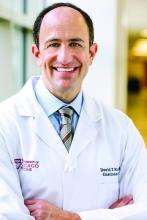Not the ultimate endpoint?
“There is ongoing interest in whether histological findings (biopsies) of the mucosa are a clinically important and reachable treatment goal in ulcerative colitis,” David T. Rubin, MD, of the University of Chicago, who was not involved in the study, said in an interview.
Questions about this approach remain, such as how findings should be incorporated into clinical care and whether histology offers advantages over patient-reported symptoms, endoscopic findings, or other surrogates of inflammation like calprotectin, a protein related to histology detected in stool, Dr. Rubin explained.
“A number of retrospective studies have demonstrated the clinical importance of achieving histological remission, but the details of how to get there are not yet clearly defined. In this study, using one of the established indices of histological activity, the Nancy Histological Index, those patients who achieved histological remission had better clinical outcomes (stable remission) than symptoms alone or endoscopy alone.”
According to Dr. Rubin, clinicians can inform patients that histological remission supports that the therapy is working and they have a very good likelihood of staying in remission over the next year.
“Importantly, this is not the same as saying we should treat to get to this endpoint,” Dr. Rubin emphasized. “If a patient is in clinical remission with normalized labs and endoscopy (or calprotectin) that show healing, we do not yet recommend adjusting therapy for histological endpoints. This was edified in the consensus paper called STRIDE 2, published in Gastroenterology in 2021.”
As for additional research, the ongoing prospective randomized VERDICT trial is exploring different endpoints of treatment, “one of which is the combination of symptoms, endoscopy, and histology to assess whether this is better than symptoms or endoscopy alone,” said Dr. Rubin. “We also need more work to understand the timing of this finding, the number of biopsies that may be required to get an adequate assessment of the bowel, how pathologists should read and interpret our findings, when we should relook if we adjust therapy, and whether some therapies are more or less likely to achieve this endpoint,” he said.
The study received no outside funding. Neither the researchers nor Dr. Rubin reported any financial disclosures.

